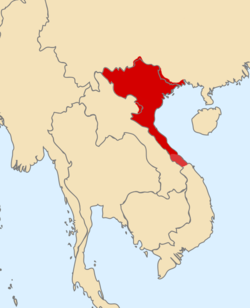Trần Dynasty
| Trần dynasty | ||||||||||
| House of Trần 陳朝 |
||||||||||
|
||||||||||
| Capital |
Thăng Long (1225–1397) Thanh Hóa (1397–1400) |
|||||||||
| Languages | Vietnamese | |||||||||
| Religion | Buddhism (official), Taoism, Confucianism | |||||||||
| Government | Monarchy | |||||||||
| Emperor | ||||||||||
| • | 1226–1258 | Trần Thái Tông (first) | ||||||||
| • | 1398–1400 | Trần Thiếu Đế (last) | ||||||||
| History | ||||||||||
| • | Lý Chiêu Hoàng ceded the throne to Trần Cảnh | 1, twelfth lunar month 1225 | ||||||||
| • | Taken power by Dương Nhật Lễ | 25, fifth lunar month, 1369 | ||||||||
| • | Re-established by Trần Nghệ Tông | Tenth lunar month, 1370 | ||||||||
| • | Hồ Quý Ly overthrew Trần Thiếu Đế | 28, second lunar month 1400 | ||||||||
| Currency | copper coins | |||||||||
|
||||||||||
The Trần dynasty (Nhà Trần, , Trần triều) ruled in Vietnam (then known as Đại Việt) from 1225 to 1400. The dynasty was founded when emperor Trần Thái Tông ascended to the throne after his uncle Trần Thủ Độ orchestrated the overthrow of the Lý dynasty. The final emperor of the dynasty was Thiếu Đế, who at the age of five years was forced to abdicate the throne in favor of his maternal grandfather, Hồ Quý Ly. The Trần dynasty defeated three Mongol invasions, most notably in the decisive Battle of Bạch Đằng River in 1288.
The Chinese region of Fujian was the original home of the Chinese Tran (Chen) clan before they migrated under Trần Kinh 陳京 (Chén Jīng) to Dai Viet. Their descendants established the Tran dynasty, which ruled Vietnam (Dai Viet), and certain members of the clan could still speak Chinese, as when a Yuan dynasty envoy met with the Chinese-speaking Tran Prince Trần Quốc Tuấn in 1282. The first of the Trần clan to live in Đại Việt was Trần Kinh, who settled in Tức Mặc village (now Mỹ Lộc, Nam Định) who lived by fishing. After three generations in Đại Việt, the Trần clan became a rich and powerful family under Trần Lý, who was Trần Kinh's grandson.
...
Wikipedia


